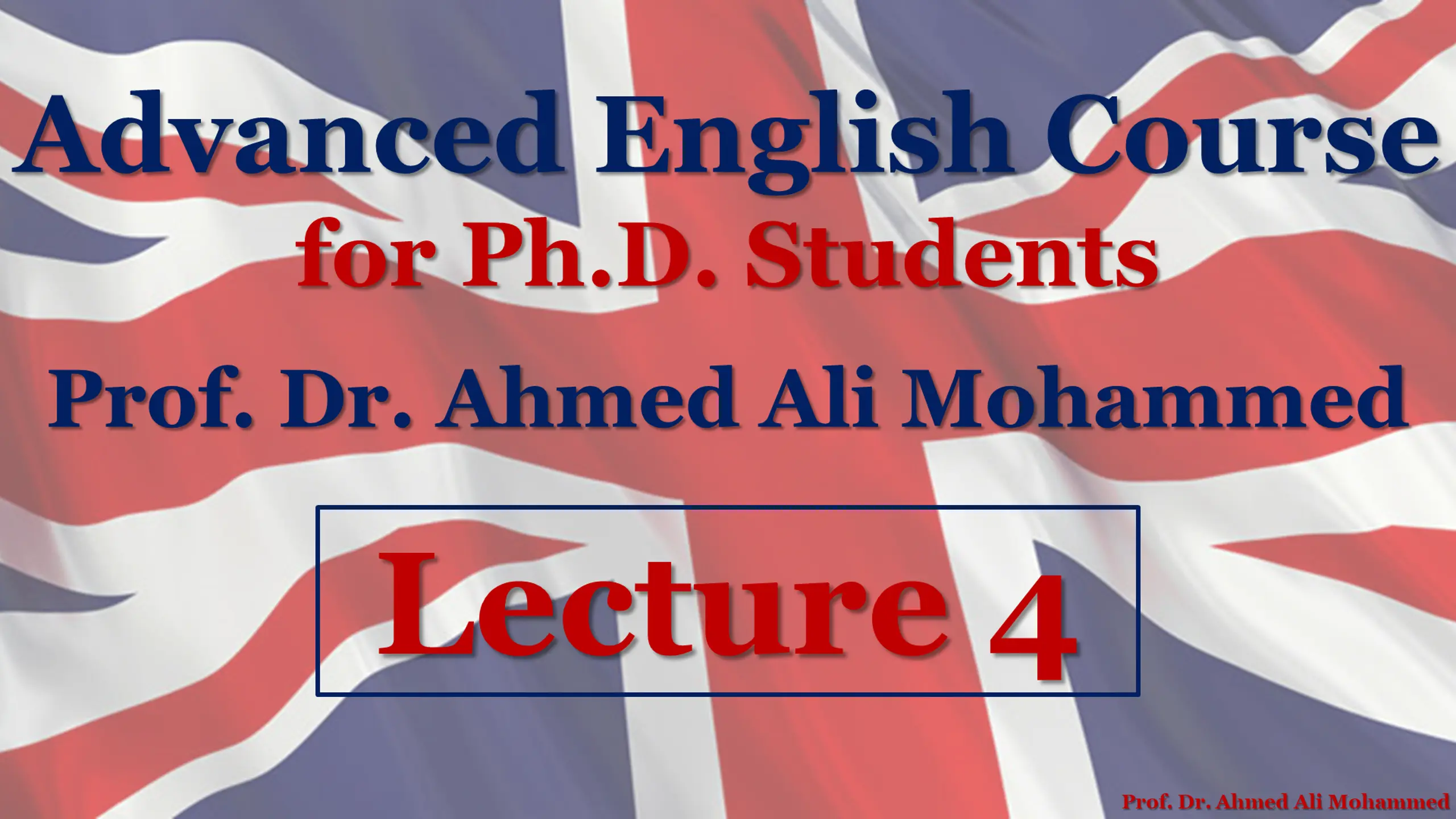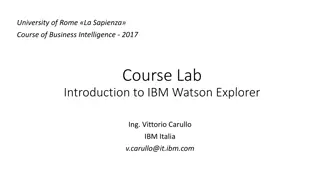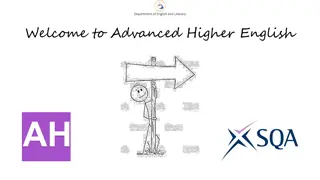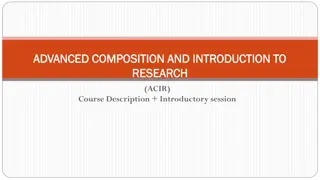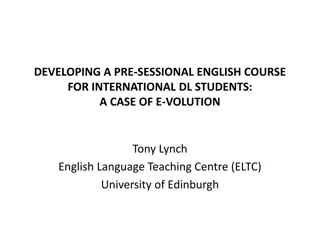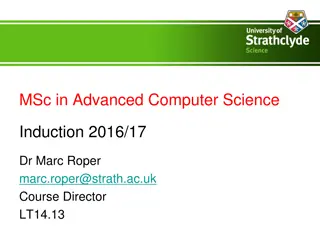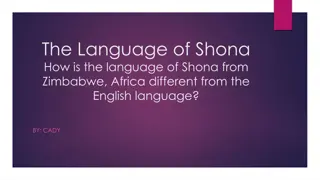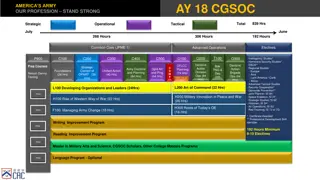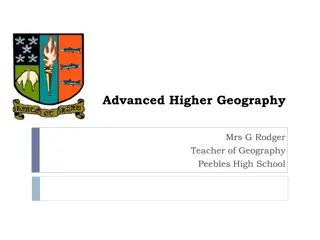Advanced English Course
Prof. Dr. Ahmed Ali Mohammed teaches Lecture 4 of the Advanced English Course for Ph.D. Students, focusing on prepositions and active & passive voice.
Download Presentation

Please find below an Image/Link to download the presentation.
The content on the website is provided AS IS for your information and personal use only. It may not be sold, licensed, or shared on other websites without obtaining consent from the author.If you encounter any issues during the download, it is possible that the publisher has removed the file from their server.
You are allowed to download the files provided on this website for personal or commercial use, subject to the condition that they are used lawfully. All files are the property of their respective owners.
The content on the website is provided AS IS for your information and personal use only. It may not be sold, licensed, or shared on other websites without obtaining consent from the author.
E N D
Presentation Transcript
Advanced English Course for Ph.D. Students Prof. Dr. Ahmed Ali Mohammed Lecture 4 Prof. Dr. Ahmed Ali Mohammed
Lecture 4 -Prepositions -Active & Passive voice Prof. Dr. Ahmed Ali Mohammed
What are prepositions? A preposition is a word or group of words used before a noun, pronoun, or noun phrase to show direction, time, place, location, spatial relationships, or to introduce an object, ex: in, at, on, of, to, for, under, towards, before. A preposition or postposition typically combines with a noun phrase, this being called its complement, or sometimes object. A preposition comes before its complement; whereas a postposition comes after its complement. English generally has prepositions rather than postpositions words such as in, under and of which precede their objects, such as: in England, under the table, of Jane Prof. Dr. Ahmed Ali Mohammed
Although there are a few exceptions including ago and notwithstanding, as in three days ago and financial limitations notwithstanding . Some rules for usage 1. Prepositions of Direction: To refer to a direction, use the prepositions to , in , into , on and onto . She drove to the store. Don t ring the doorbell. Come right intothe house. Drive onto the grass and park the car there. 2. Prepositions of Time To refer to one point in time, use the prepositions in , at and on . -Use in with parts of the day (not specific times), months, years, and seasons. Prof. Dr. Ahmed Ali Mohammed
He reads in the evening. The weather is cold in December. She was born in 1996. We rake leaves in the fall. -Use at with the time of day. Also use at with noon, night, and midnight. I go to work at 8:00. He eats lunch at noon. She often goes for a walk at night. They go to bed at midnight. -Use "on" with days. I work on Saturdays. He does laundry on Wednesdays. Prof. Dr. Ahmed Ali Mohammed
To refer to extended time, use the prepositions since,for,by,during, from to , from until , with and within . I have lived in Paris since 2005. (I moved there in 2005 and still live there.) He will be in Toronto for 3 weeks. (He will spend 3 weeks in Toronto.) She will finish her homework by 6:00. (She will finish her homework sometime between now and 6:00.) He works part time during the summer. (For the period of time throughout the summer.) I will collect data from January to June. (Starting in January and ending in June.) They are in school from August until May. (Starting in August and ending in May.) She will graduate within 2 years. (Not longer than 2 years.) Prof. Dr. Ahmed Ali Mohammed
3. Prepositions of Place To refer to a place, use the prepositions in (the point itself), at (the general vicinity), on (the surface) and inside (something contained). They will meet in the lunchroom. She was waiting at the corner. He left his phone on the bed. Place the pen inside the drawer. To refer to an object higher than a point, use the prepositions over and above . To refer to an object lower than a point, use the prepositions below , beneath under and underneath . The bird flew over the house. The plates were on the shelf above the cups. Basements are dug below ground. Prof. Dr. Ahmed Ali Mohammed
There are blood capillaries beneath the skin. The squirrel hid the nuts under a pile of leaves. The cat is hiding underneath the box. To refer to an object close to a point, use the prepositions by , near , next to , between , among and opposite . The gas station is by the grocery store. The park is near her house. Park your bike next to the garage. There is a deer between the two trees. There is a purple flower among the weeds. The garage is opposite the house. Prof. Dr. Ahmed Ali Mohammed
4. Prepositions of Location To refer to a location, use the prepositions in (an area or volume), at (a point) and on (a surface). They live in the country. (an area) You will find him at the library. (a point) There is a lot of dirt on the window. (a surface) 5. Prepositions of Spatial Relationships To refer to a spatial relationship, use the prepositions above , across , against , ahead of , along , among , around , behind , below , beneath , beside , between , from , in front of , inside , near , off , out of , through , toward , under and within . The post office is across the street from the grocery store. We will stop at many attractions along the way. Prof. Dr. Ahmed Ali Mohammed
The kids are hiding behind the tree. His shirt is off. Walk toward the garage and then turn left. Place a checkmark within the box. -Prepositions Following Verbs and Adjectives Sometimes verbs and adjectives can be followed by different prepositions, giving the phrase different meanings. -Some Common Verb + Preposition Combinations About: worry, complain, read He worries about the future. She complained about the homework. I read about the flooding in the city. Prof. Dr. Ahmed Ali Mohammed
At: arrive (a building or event), smile, look He arrived at the airport 2 hours early. The children smiled at her. She looked at him. From: differ, suffer The results differ from my original idea. She suffers from dementia. For: account, allow, search Be sure to account for any discrepancies. I returned the transcripts to the interviewees to allow for revisions to be made. They are searching for the missing dog. In: occur, result, succeed The same problem occurred in three out of four cases. Prof. Dr. Ahmed Ali Mohammed
My recruitment strategies resulted in finding 10 participants. She will succeed in completing her degree. Of: approve, consist, smell I approve of the idea. The recipe consists of three basic ingredients. The basement smells of mildew. On: concentrate, depend, insist He is concentrating on his work. They depend on each other. I must insist on following this rule. To: belong, contribute, lead, refer Bears belong to the family of mammals. I hope to contribute to the previous research. Prof. Dr. Ahmed Ali Mohammed
My results will lead to future research on the topic. Please refer to my previous explanation. With: (dis)agree, argue, deal I (dis)agree with you. She argued with him. They will deal with the situation. Prof. Dr. Ahmed Ali Mohammed
Some Common Adjective + Preposition Combinations Prof. Dr. Ahmed Ali Mohammed
Here is how to use them Prof. Dr. Ahmed Ali Mohammed
Exercise 1. This master s degree consists .. six modules. 2. There are many scholarships available .. overseas students. 3. Education in most countries is funded mainly the state. 4. The internet is a good source .. information. 5. If you wish to apply .. a university, you should prepare your application carefully. of for by of to Prof. Dr. Ahmed Ali Mohammed
Active and Passive Voice In traditional grammar, voices of verb is defined as the quality of verb that indicates whether its subject acts or is acted upon. It has two types: the active voice and the passive voice. The active voice is the normal voice. It is the voice that we use most of the time. Active voice is used to show that the subject of the sentence is performing or causing the action, ex: The dog jumped onto the boy. The dog (subject) is doing the jumping (verb) onto the boy (object). Kristy will give a book report to the class. Kristy (subject) is doing the giving (verb) to the class (object). Prof. Dr. Ahmed Ali Mohammed
The passive voice is less usual. In the passive voice, the subject receives the action of the verb. We use the passive voice when we want to make the active object more important and the subject is the recipient of the action. The boy was jumped on by the dog. Boy (subject) was being jumped on (verb) by the dog (object). A book report will be given by Kristy to the class. Report (subject) will be given (verb) by Kristy (object). Why does it matter? Active voice is more direct and concise. Passive voice is usually wordier. When would you want to use passive voice? When intentionally trying to hide the subject of the sentence. Prof. Dr. Ahmed Ali Mohammed
ThankYouFor Your Listening Prof. Dr. Ahmed Ali Mohammed
See You Next Lecture Prof. Dr. Ahmed Ali Mohammed
